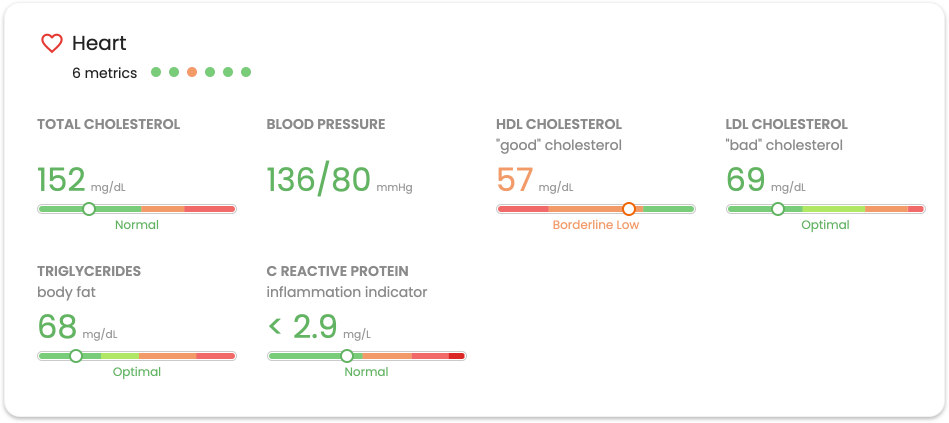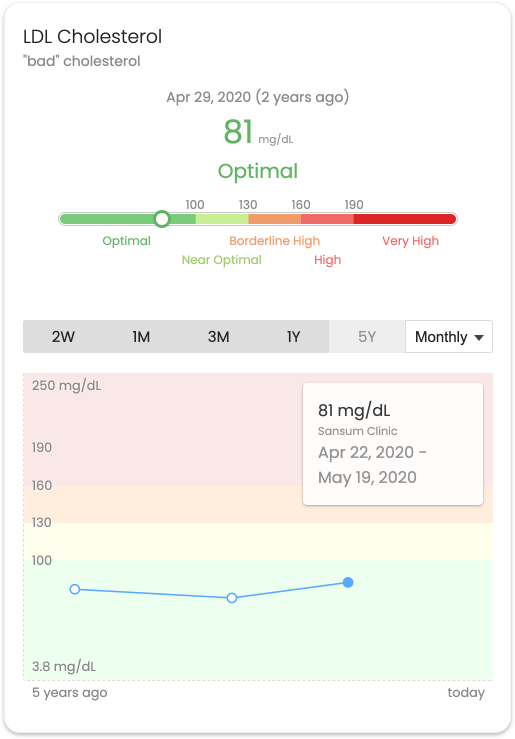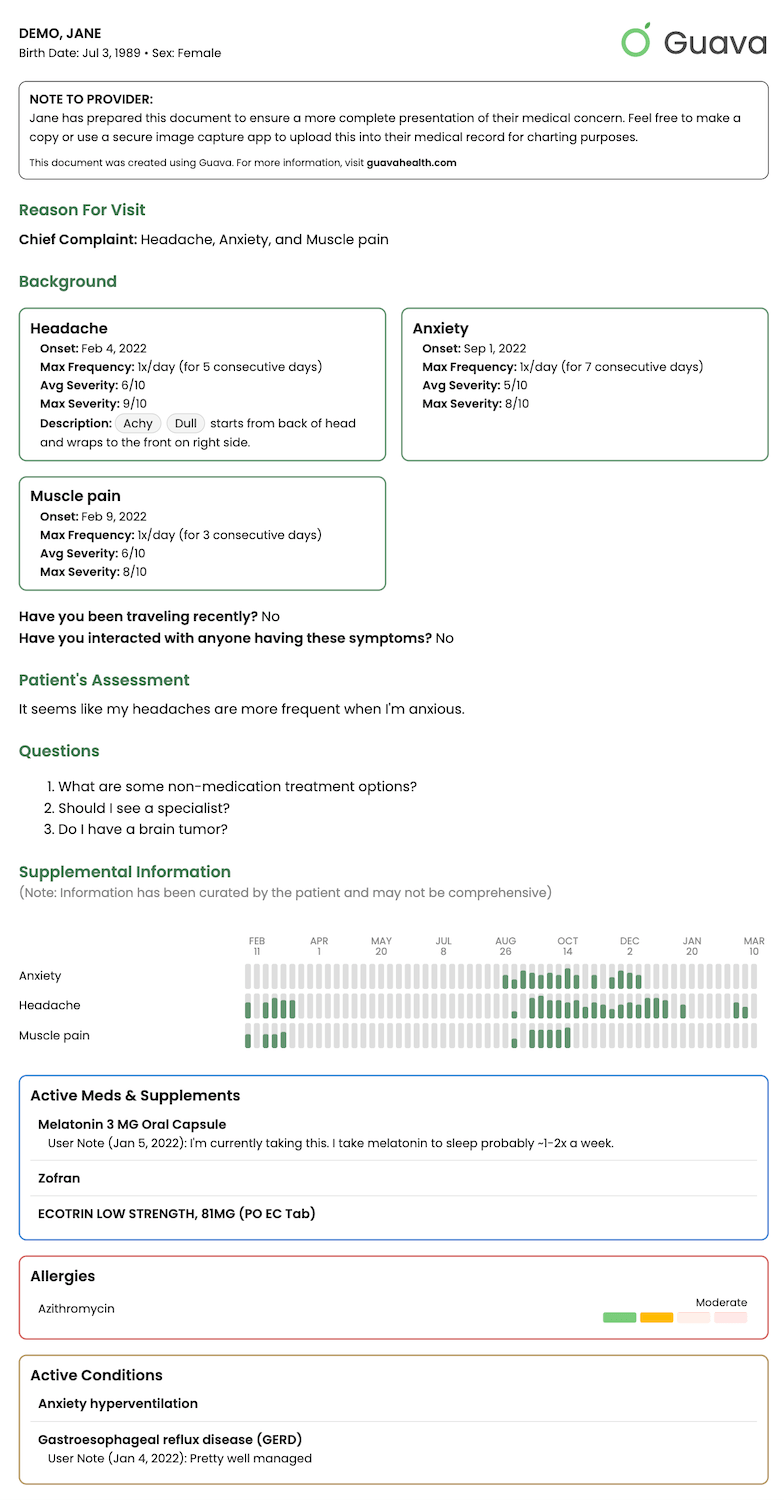Why track your health?
Tracking your health early can help you detect problems before they arise, save time and money by having the right information during doctor visits, and help you take control of your health.

Be Proactive. Don't wait until something is wrong to start caring about your health.
The common approach to health for most people is to visit the doctor when issues come up. Otherwise, they avoid the healthcare industry as much as possible. Some are a bit more on top of their health and visit their primary care doctor once a year for their physical, while some don't even have a primary care doctor. The problem with a reactive approach is that only caring about your health when something is wrong costs more money, takes more of your time, and in some cases, may be too late for you to change course.
Instead, investing in your health early on with preventative actions such as regular lab testing and early detection screenings can inform you which part of your health is at risk or could improve. From there, you can take action before it becomes a more serious health issue. Even if you're young or consider yourself relatively healthy, understanding your health metrics can help you improve your health, memory, energy, mood, and sex drive.
Save time and money by having the right information during doctor visits
When dealing with a new condition or injury, the last thing you want to do is try to track down your historical medical records.
Your medical records can provide your doctor with the whole picture and help them give you a faster and more accurate diagnosis. Instead of trying to remember important things like your allergies, vaccination schedule, or previous lab results, you can bring your records and refer back to them throughout the appointment. This prevents you from misremembering or accidentally leaving out a piece of crucial information.
Having your previous MRIs, X-rays, and recent blood test results on hand can save you from having to spend time and money retaking any unnecessary tests. Similarly, having a record of all the medications you have taken in the past can help you avoid being prescribed medications you've already tried.
Don't let your medical records get deleted
Health systems in the US are not required to keep your data forever. Some hospitals may choose to keep your records around, but depending on the state, your medical records could be deleted after 5-10 years. After that, they're gone forever. Start collecting your medical records early to make sure you have a copy of your data before it is deleted.
What health data should I track?
Medical Records
Your largest source of health data is probably your medical records. Unfortunately, unless you’ve only ever been to one doctor, your medical records are likely scattered between the different health systems you've visited. These records include immunization records, prescriptions, allergies, lab results, X-rays, and more. Even if you rarely go to the doctor, your provider likely has a decent amount of records on you.
To begin tracking your health, start by making a list of all the hospitals and clinics you've been to. Make sure to include your primary care doctor, hospitals and clinics you have visited in the past, pharmacies, student health, and urgent cares. See our article for more information about how to get your medical records.
Health and Fitness Devices
Health and fitness devices provide more continuous metrics than medical records and allow you to see trends from day to day. Common fitness trackers and smart scales from companies like Fitbit and Garmin can track sleep patterns, resting heart rate, steps, blood oxygen, weight, and more. Some devices can also track blood pressure or glucose levels.
You can use tracking apps as well for things like nutrition tracking, workout tracking, alcohol and caffeine logging, female cycle tracking, and so on. Technology is constantly improving, so keep a lookout for new devices that support new types of health metrics.
Paper Records
If you are older than 10 years old, more likely than not, there are some records of you on a piece of paper collecting dust in a file cabinet at home. They could be paper vaccination cards from when you were growing up, various printouts from different clinics or hospitals, health insurance bills, prescription orders, and results from at-home tests. To avoid lugging around paper records to each appointment, you can digitize these records and keep your health information safer and more accessible.
It may also be important to note down any important events you remember, such as that injury from a ski trip you went on a few years ago but never saw a doctor about. If you've done a genetics test, it's useful to keep it with the rest of your records, since your genetics can inform you and your doctor of any potential health risks to watch out for or insights on improving your diet and energy.
What tool should I use to track my health?
You may realize your health data is scattered across many health systems, patient portals, websites, and fitness apps. Here are some examples of what you might be using:
- One patient portal for each of your doctors and hospitals
- One login for each at-home testing service and genetics testing service
- One app for each fitness tracker and smart scale
- Apps for tracking medications and supplements
- Apps for tracking nutrition, caffeine consumption, and workouts
- Apps for tracking your mood and mental health
- Apps for tracking menstrual cycle
- Apps that manage a specific chronic disease, such as Parkinson's or diabetes
- Apps storing photos and PDFs of health documents
We created Guava to help you manage your health records securely in one place. With Guava, you can connect your patient portals, fitness devices, and apps, as well as upload photos of your paper documents. We fetch all your past records from your patient portals and send you notifications when new records are available after visits. We automatically extract useful health information from your uploads so you don't need to spend time transcribing your paper records.
What should I do after I have all my health data?
With all your records in one place, you can start understanding your health in full by looking at your historical data, doing your own research on your test results, and sharing your health profile with your family and doctors during visits.
Organizing and understanding your data
Visit summaries and lab results may not be the easiest to understand without medical knowledge. They contain a lot of acronyms and display data in a way that leaves you asking your doctor many questions in the little time you have during your visit. If you're interested in diving in yourself, government websites such as the CDC (Centers for Disease Control and Prevention), NIH (National Institutes of Health), HHS (Department of Health & Human Services), and MedlinePlus.gov, can provide useful information about various lab tests, conditions, health risks, and recommendations. If you're using Guava to track your health, it's even simpler.
Guava organizes and displays your data in an easy-to-understand way. We take reference ranges and risk factors from the CDC and other trusted health sources, summarize and display them simply, and provide additional links for those inclined to dive deeper and read more.

You can also see how metrics like resting heart rate, cholesterol, blood glucose levels, and weight change over time. This allows you and your doctor to better spot trends and issues before they arise. It holds you accountable and allows you to see concrete progress on how your lifestyle and nutritional changes are affecting your body.

Sharing your health profile with family and doctors
You may want to share your health profile with your primary care doctor, your family, or other healthcare providers for a second opinion. If you care for aging parents or young children, you can help them track their health too. Guava makes it easy to share your profile and manage your family's profiles.

You can use our visit prep feature to prepare for your doctor’s appointments. With this feature, you can create an easy-to-read summary of your health history, any concerns, inklings, or questions you have, and important timelines vetted from the app. Instead of thumbing through records to try and find the answers to your doctor’s questions, you can now have most of the information you’ll need in a short visit prep summary.
You can also consider scheduling recurring tests to observe how your health progresses over time. In some cases, based on your family history, genetics, age, demographics, and past tests, you may need to get certain tests and screenings more frequently if you are predisposed to certain health conditions, such as high cholesterol or diabetes. Therefore, Guava allows you to easily schedule lab tests that you may need from your account.
Maintaining and improving your health doesn't happen overnight. Take the first step now to start managing and controlling your health.





